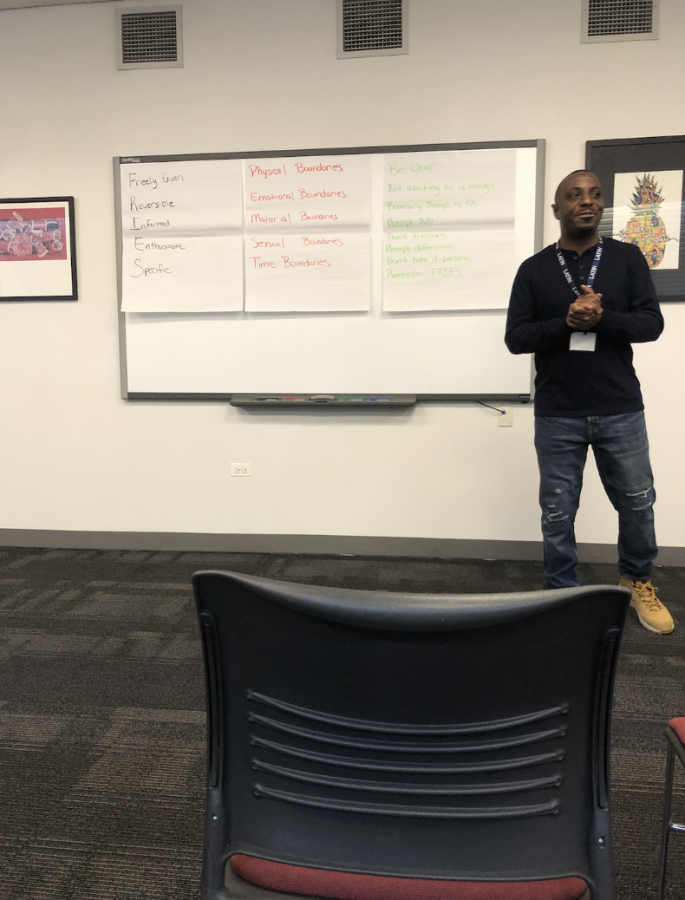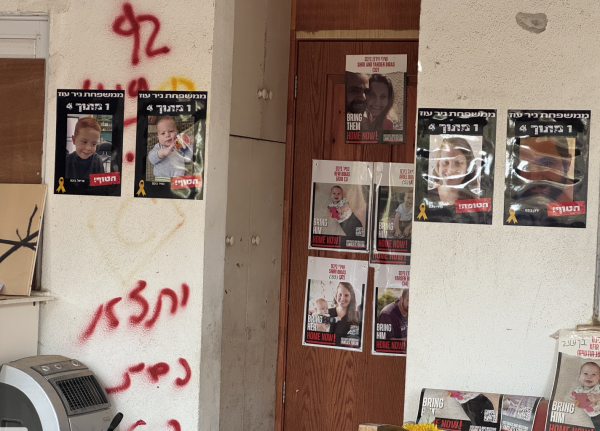Consent Workshops in Place for Juniors
Planned Parenthood Chicago Representative Edwin Irvin teaches a workshop.
Latin’s juniors participated in a 50-minute consent workshop on December 2, during which they learned how to establish boundaries, create healthy relationships, and explore first steps in consenting to sexual activities. These topics and the discussions surrounding them highlighted the class of 2024’s squeamish sentiment toward sexual education. As with most high schoolers, talking about taboo topics like this can be difficult.
Post-high school, when it’s essential to be a well-informed citizen on consent and boundaries, all Latin students should feel comfortable in their skills to respect others and to demand the same respect. Though it may seem arduous right now, more workshops and discussions surrounding consent should happen to ensure this confidence.
Gathering input from students through a survey is a constructive way to gauge what students might like to see happen in the future with workshops and curriculum. Additionally, to make sure all students feel they have a voice in Latin’s sex ed curriculum, a survey is a direct, confidential source of input.
One possible way to provide resources for all students is to create a RomanNet bulletin board containing important information through links. Additionally, handouts with QR codes could be posted throughout the school for easy access. Hotlines, Clinic Centers throughout Illinois, and other resources can make up the bulletin board and handouts.
“I anticipated people feeling uncomfortable,” Edwin Ervin, Planned Parenthood Illinois’ Education and Outreach specialist and one of the workshop leaders, said. “So I was prepared for any giggles and laughs, which is something that normally happens when we’re talking about sexual pleasure.”
“I was also prepared to dispel any myths,” he said. “[At] the schools I’ve been to before, one of the myths I remember off the top of my head is that, if people are in an established relationship, then consent isn’t something that’s really important.” Mr. Ervin noted that, while being a common understanding, this isn’t actually true.
For freshmen, a year-long course on overall well-being is split into two sections of one semester each: Wellness and Affective Education. While the pandemic threw a wrench into how each was taught, the courses have taken on new meaning this school year. Though the general principles remain the same compared to past years, more variety in the curriculum is present for freshmen. For example, a cardiopulmonary resuscitation (CPR) course and a fitness and games course are new this year, while swimming, yoga, and sex ed have made a return.
The current juniors’ sex ed portion of the ninth-grade Affective Education course was taught primarily online, with the exception of a small group of students whose cycle landed in person in the spring of 2021. Sex ed for this grade covered only the most basic principles of comprehensive sex education: sexually transmitted infections (STIs) and how to prevent them, a summary of the male and female anatomical structures, and lessons about consent.
“I feel like this workshop could most certainly connect in a much bigger and impactful way if we learned more freshman year about sex ed,” junior Nadia Rivera said. “The only thing I can remember about sex ed freshman year was what the reproductive organs were and their basic functions.”
Junior Asher Bremen said, “I think Latin does a good job of making sure to bring in experts at least once a year to educate students.” This being said, the juniors might benefit from a refresher course or more than one workshop to brush up on topics we learned (and have forgotten) from freshman year.
In order to remember an important topic, it must be important to you. So, whether this forgetfulness of topics discussed in sex ed is the fault of the juniors or their educators is up to each individual to decide; however, a course of basic information should be taught at least once every school year to ensure students have adequate knowledge of healthy relationships, consent, and overall sex ed.
Nadia said, “I feel like the workshops always end up being awkward and not as informative as many hope them to be.” This sentiment certainly rang true during the workshops, as there was a sense of uneasiness throughout. “It’s kind of something that many students kind of dread going to,” Nadia continued.
“I would really focus on what consent looks like [or] doesn’t look like, why it’s important, and why talks like these benefit our sex lives as we get older and things like that,” Nadia said, adding, “Sexuality and how that could manifest itself” is definitely important to discuss in the consent workshops.
“When we’re going into schools where we’re talking about consent,” Mr. Ervin said, “the curriculum is centered around the concept of FRIES, which is something that Planned Parenthood has come up with.” FRIES teaches the five main points of consent:
F – freely given , R – reversible, I – informed, E – enthusiastic, S – specific.
Elissabeth Legendre, Upper School Latin teacher and ninth-grade sex ed teacher, said, “The curriculum as it stands right now is very similar to what Planned Parenthood recommends, based on their own research and their best practices.” The Planned Parenthood sex ed curriculum “cover[s] topics like communication skills, decision making, birth control, how to prevent sexually transmitted infections (STIs), healthy relationships, consent, body image, anatomy, and puberty.”
Mr. Ervin said, “Communication is always needed, whether you’ve been with someone 10 minutes or 10 years. [Planned Parenthood] hope[s] that the resources we provide are the beginning of a conversation, and something that would never end, something that’s ongoing.”
Latin is making strong efforts to educate its students on the importance of reproductive health, but we can go further with surveys, RomanNet bulletin board posts, and handouts with QR codes. Over time, I hope to see that these resources find their place at Latin. Whether a student needs them or not, it is reassuring to have easily accessible support, even on pieces of paper in the hallways or below a tab on RomanNet.

Annie Hallinan (‘24) is a senior at Latin who is beyond excited to return to The Forum for her third year on staff. Aside from serving as Managing &...



















































